Comedy, romance and tragedy rolled into a Shakespeare classic: Antony and Cleopatra
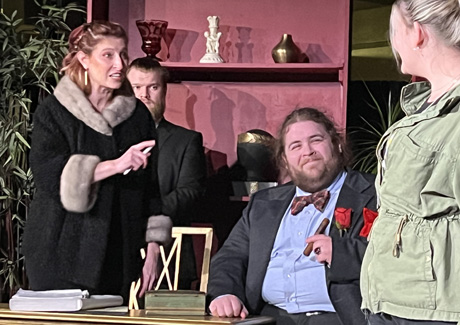
How do you get through a play with nearly 4,000 lines of script and requires just under double the amount of actors that you have?
“It’s a long play. We did a play review, we went line by line and chose what lines to keep and what we could cut,” Director Jane Burk said of the Shakespeare in Springtime debut production. “We cut a lot. One act has 13 scenes, act four has 15 or 16 scenes. We had to pick and choose what scenes to cut or combine.”
Not the glamorous side of theater, perhaps, but important all the same. Reviewing words to be spoken — William Shakespeare’s words, no less — is nothing to dismiss as an idle task. Burk has been trading off the director’s role for the Batavia Players Shakespeare in Springtime series every other year, and this time it's her turn.
The play is “Antony and Cleopatra,” the second longest of Shakespeare’s works, and set in late B.C. Considered part comedy, romance, and tragedy, it hits the stage at 7:30 p.m. Friday at Batavia City Centre’s concourse.
Major characters are, of course, Mark Antony, a Roman general and one of the three joint leaders known as triumvirs who rule the Roman Republic after the assassination of Julius Caesar; Octavius Caesar, adopted son of Julius; Lepidus; Cleopatra, queen of Egypt who follows six Cleopatras before her; and Sextus Pompey, a rebel against the triumvirate and son of the late Pompey.
Mark Antony—one of the triumvirs of the Roman Republic, along with Octavius and Lepidus—has neglected his soldierly duties after being beguiled by Egypt's Queen, Cleopatra. He ignores Rome's domestic problems, including the fact that his third wife, Fulvia, rebelled against Octavius and then died.
Octavius calls Antony back to Rome from Alexandria to help him fight against Sextus Pompey, Menecrates, and Menas, three notorious pirates of the Mediterranean. At Alexandria, Cleopatra begs Antony not to go, and though he repeatedly affirms his deep passionate love for her, he eventually leaves.
The triumvirs meet in Rome, where Antony and Octavius put to rest, for now, their disagreements. Octavius' general, Agrippa, suggests that Antony should marry Octavius's sister, Octavia, in order to cement the friendly bond between the two men. Antony accepts. Antony's lieutenant Enobarbus, though, knows that Octavia can never satisfy him after Cleopatra. In a famous passage, he describes Cleopatra's charms: "Age cannot wither her, nor custom stale / Her infinite variety: other women cloy / The appetites they feed, but she makes hungry / Where most she satisfies."
Burk saw a stage production a “very, very, very long time ago,” she said and has gotten up to speed on the show and how she has wanted to put her own twist on it.
“So many things happened, basically, all within a relatively short time, that brought about the downfall of all of these people. And it was a tragedy, with the one exception of Octavius Caesar, who survived. There were military battles, there were sea battles that occurred in northern Egypt, in the Roman area of Italy, and throughout the area of the Eastern Mediterranean. I mean, historically, this was a very volatile period of time. Shakespeare was writing a play, so he made mention of many of these different activities that were happening and how they were reflected in the time period. But his main focus, because he was a playwright, was the actual personal relationship between Mark Antony and the other two members of the triumvirate,” Burk said. “And then, on the other hand, between Mark Antony and Cleopatra, who was a ruler and a queen in her own right. She lived from approximately 51 BC until she died by suicide in 30 BC. Mark Antony, he was a little bit older than her, his birth date was somewhere around the mid-80s, 82 or 83 BC. But his death was also by suicide in 30 BC, which was technically the end of the issue of the Roman dynasty, and of the Egyptian dynasty and how they related to each other, militarily and politically.
“Realistically, you could almost point the finger at what happened between Mark Antony and Cleopatra and their downfall. And what happened to the countries where they lived in that time period,” she said. “And the military issues that arose. That all played into that, that final thing of being left with one specific Emperor, who was Augustus Caesar, and the head of the Roman Empire.”
One-half of the City Centre stage will be dressed in traditional B.C. scenery and costuming and dialogue, while the other half will sport a contemporary look, she said. While the historic views may not seem relevant today, might they be?
“And so there's a juxtaposition between how the two who are contemporary and are so not contemporary, are they contemporary? Are things that happened in the long ago time of Egypt, are they still relevant today? And those that have some impact on what is happening in the Roman place, and vice versa?” she said.
All of the action is on stage, and that means all of the action — actors and audience. There is seating for 60. Placing spectators around the stage at ground level with a split stage of time periods just would not have worked, Burk said.
And “lighting is very important.”
“It’s going up on one side while going down on the other,” she said. “It’s a truly amazing cast, I could not be more proud of them. I was so relieved to have them try out. We have an extraordinarily talented cast.”
The show is 2 1/2 hours, plus intermission, and debuts at 7:30 p.m. Friday and continues at 7:30 p.m. Saturday and 2 p.m. Sunday at Main St. 56 Theater, Batavia City Centre. Enter through the purple door next to Batavia Family Dental.
Tickets are $16 for adults and $14 for students and seniors. To purchase tickets, go HERE.
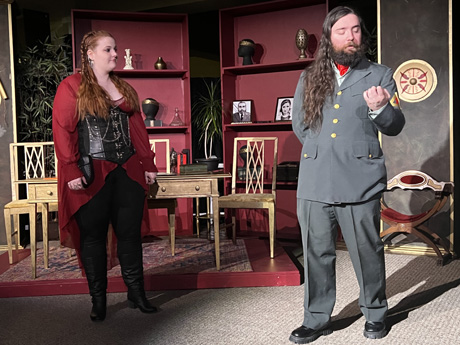
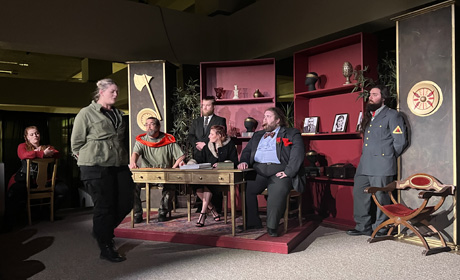
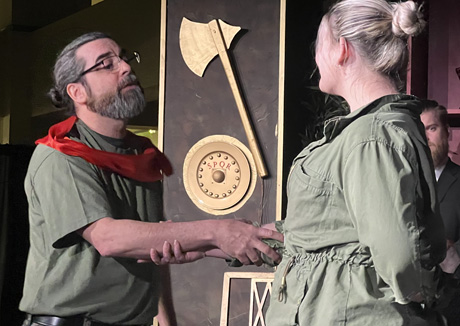
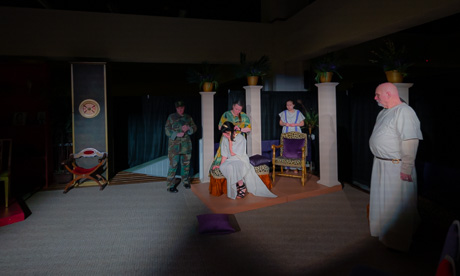
Top Photo, left to right, Cynthia Nelson as Caesar, Shaun Coburn as Dollabella, James Barcomb as Lepidus and Jacqueline Morrison as Pompey; Erin Stamp as Menas and Elijah Van Epps as Enobarbus; Erin Stamp as Menas, Jacqueline Morrison as Pompey, Steve Coburn as Marc Antony, Shaun Coburn as Dollabella, Cynthia Nelson as Caesar, James Barcomb as Lepidus and Elijah Van Epps as Enobarbus; Steve Coburn as Marc Antony and Jaqueline Morrison as Pompey; and Kendra Morrison as Alexis, Emily Crawford as Cleopatra, Shellene Bailey as Charmian and Patrick Burk as Mardian. Photos by Howard Owens.
